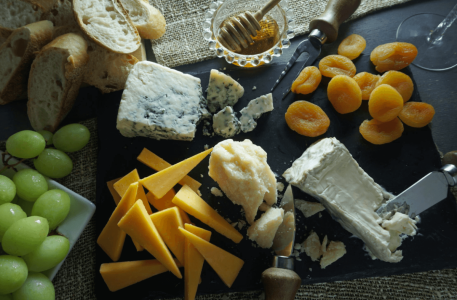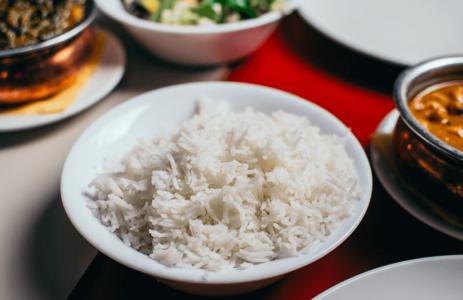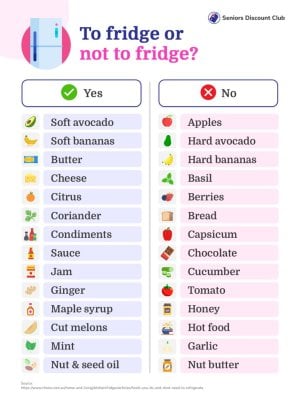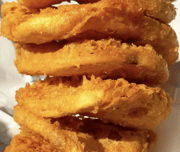Kitchen Tips: Here are the food items you need (and don’t need) to put in the fridge!
- Replies 6
Do you often find yourself staring into the fridge, trying to decide where everything should go? Are you constantly throwing out rotten food, simply because you don't know if it's best stored in the fridge or your pantry?
Then this article is perfect for you. And if not, you still might learn something new!
It's always important to know which foods to store in the fridge, and which ones are best left out in the pantry.
This goes beyond simple food storage preferences; knowing the proper storage conditions of different food items is key to food safety and reducing food waste.
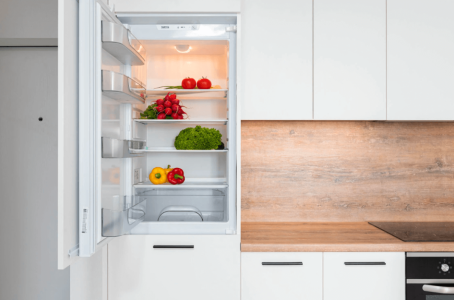
Many fresh foods, such as meat, dairy, and certain types of produce, are prone to bacterial growth and spoiling. Keeping these items in the fridge can help prevent foodborne illnesses, and extend their shelf life.
However, certain fruits and vegetables do better when stored at room temperature, such as tomatoes, bananas, and potatoes. Storing these items on the countertop or in the pantry helps them ripen properly and maintain their flavour and texture.
To ensure your groceries stay fresh and delicious, and help you navigate this tricky but important kitchen hack, CHOICE home economist Fiona Mair and fridge expert Ashley Iredale have come together to bring us a definitive list of foods that should, and absolutely should not, be refrigerated.
You may be surprised at some of the items on this list, so read on because your kitchen holds the key to saving your hard-earned money and protecting your health at the same time!
Which food items SHOULD GO in the fridge?
Cheese
Do you love cheese and want to make sure it stays fresh and tasty? Store your cheese in the dairy compartment of your fridge (usually found on the top of the fridge's door) - this will help prevent it from absorbing odours from other foods and keep it at a temperature that's just right.
But what if your dairy compartment is already full? Don't worry - you can still store your cheese in other parts of the fridge, like the main compartment, if necessary. Just keep in mind that if you store it in a warmer area, it may not last as long. So if you're not planning to eat it right away, it's best to keep it in a colder spot.
When it comes to wrapping your cheese, you might think that cling wrap is the way to go. However, this can cause your cheese to sweat and affect its flavour and texture. Instead, try storing your cheese in the paper it came in or in baking paper, which allows it to breathe and stay fresh.
Milk
We all love the convenience of storing our milk in the fridge door, but did you know that this may not be the best spot for it? The truth is that the shelves on the door are often a bit warmer than other parts of the fridge, which can make it harder to keep milk at the right temperature. Ideally, milk should be kept at or below 4°C to help it stay fresh for longer.
One simple solution is to store it in a colder spot inside the fridge, such as in the main compartment. This can help keep the temperature consistent and ensure that your milk stays fresh and delicious for as long as possible.
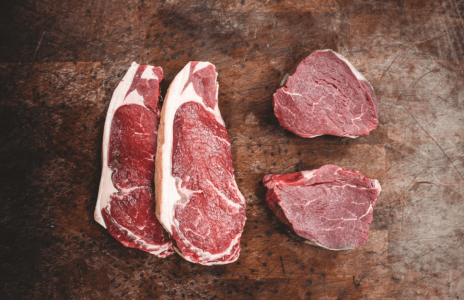
Meat, poultry, and seafood
It's important to refrigerate these items as soon as possible after you get home from the supermarket. This can help prevent the growth of harmful bacteria that can cause foodborne illnesses. Ideally, you should store them in the chiller compartment (bottom shelf) of your fridge, which is usually set close to 0°C.
But if your fridge doesn't have a chiller, don't worry - just keep them in the coldest part of your fridge, like at the back where it's less likely to be affected by warm drafts from the door opening and closing.
When it comes to how long you can store these foods in the fridge, it's important to be mindful of food safety guidelines. Raw chicken and other poultry should only be kept in the fridge for a couple of days at most. If you're not planning to use it within that time, it's best to freeze it to avoid the risk of food poisoning.
Cooked chicken, on the other hand, can last a bit longer in the fridge - usually three or four days if stored in an airtight container. Just be sure to heat it to at least 70°C when reheating it to kill any bacteria that may have grown, and don't reheat it more than once to ensure it stays safe to eat.
Cooked rice
When it comes to rice, it's essential to remember that it has a shorter shelf life than other leftovers. This is because it contains a bacterium (Bacillus cereus) that can make you sick if it's not handled properly. Keep in mind that this is not killed off by cooking, so it's crucial to store rice correctly to avoid food poisoning.
If you're planning to store cooked rice, refrigerate it as soon as it's cool enough, ideally within an hour of cooking. When you're ready to eat it, make sure to reheat it thoroughly to at least 60°C, preferably hotter.
If you don't plan to eat the rice within a day or two, it’s best to freeze it. Freezing rice immediately after cooking will preserve it for up to two months. That way, you can always have a delicious and safe meal on hand.
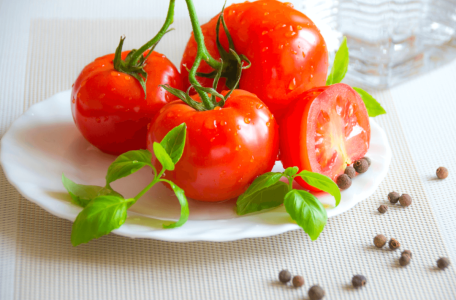
Which food items SHOULD NOT GO in the fridge?
Tomatoes
If you love the taste of fresh, juicy tomatoes, you might want to keep them on your kitchen bench instead of storing them in the fridge. Research has shown that temperatures below 12°C can limit the development of aroma and flavour in tomatoes, making them less tasty to eat.
Mair suggests keeping tomatoes in a fruit bowl to maintain their full flavour. Mair also recommends buying a mix of firm and slightly soft tomatoes so you can enjoy perfectly ripened ones throughout the week.
Also, make sure to keep them away from ethylene-producing foods like bananas, apples, pears, and oranges (so perhaps not in the fruit bowl after all…). Ethylene is a gas that can accelerate the ripening process and cause your tomatoes to spoil more quickly.
Coffee
Do you keep your coffee in the fridge to keep it fresh? Well, you might want to rethink that - apparently, doing this can make it lose its flavour and absorb odours from other foods in your fridge. Yuck! No one wants to taste garlic or cheese in their morning coffee.
To keep your coffee tasting its best, store it in an airtight container in a cool and dark place, like your pantry. This will keep your coffee beans away from sunlight, heat, steam, and moisture. If you want your coffee to taste even better, buy fresh coffee beans and use them within one to four weeks after roasting.
Some people freeze their coffee to keep it fresh for longer. However, experts recommend against it. But if you do decide to freeze your coffee, make sure you put it in a truly airtight container and freeze it in small portions. Also, keep in mind that once you take out the coffee from the freezer, it's best not to put it back in again.
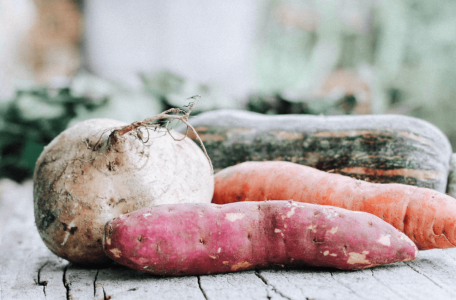
Uncut root vegetables
What about storing some of your favourite root vegetables? Potatoes, onions, sweet potatoes, and garlic should be stored outside of the fridge - and in a cool, dry, and dark spot in your kitchen.
According to experts, root vegetables absorb moisture in the fridge, leading to fermentation (faster rotting) and a reduction in taste and quality.
Once they're cut, though, it's a different story.
For instance, cut onions are best covered or placed in a sealed container and stored in the fridge. As for whole pumpkins, they can be stored outside of the fridge for many weeks, but once cut, they should be stored in the fridge as well.
Oils and sauces
When it comes to oils and sauces, it's important to store them correctly to ensure they last and taste their best.
According to Mair, coconut oil should be kept in a cool, dark place like the pantry, while nut and seed oils are best kept in the fridge to prevent them from going rancid quickly.
As for sauces, it all depends on the type and whether they've been opened. Always check the label to see if it says 'refrigerate after opening' for bottled sauces like soy sauce, sweet chilli sauce, oyster sauce and curry pastes.
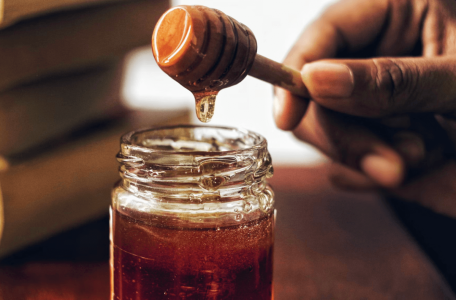
Honey and nut spreads
If you're a honey or nut spread lover, you may be wondering how best to store these delicious treats. Well, the answer depends on the specific type of spread you have. So, always remember to check the label for advice.
Honey is one of the most unique foods on the planet, as it never spoils! This is because bacteria can't grow in it. So, you can leave your honey in your pantry, where it will stay soft and easy to spread. When refrigerated, honey crystallises, but don't worry - it's still perfectly edible.
However, it's worth noting that botulism, a type of bacteria, may be present in honey. While this isn't harmful to adults, it's best to avoid giving honey to babies under 12 months old.
When it comes to peanut butter, it's okay to keep it in your pantry for up to three months after opening. But if you want to extend its shelf life and avoid oil separation, you can also keep it in the fridge. However, be aware that this could make it harder to spread.
Fresh herbs
If you're a fan of adding fresh herbs to your meals, you may be wondering where the best place is to store them to keep them fresh for longer. According to experts, some herbs like coriander and mint are best stored in the fridge crisper. Just wrap them loosely in some absorbent paper and pop them into a sealed container.
But when it comes to basil and parsley, things get a bit trickier. These herbs are better off outside the fridge, as the dry air in the refrigerator can cause the leaves to wilt quickly and turn a less-than-appetising shade of brown.
To store them, you can simply cut the bottom of the stems and place them in a jar with a small amount of water. This will keep them fresh for longer, but be sure to change the water and trim the stems every couple of days.
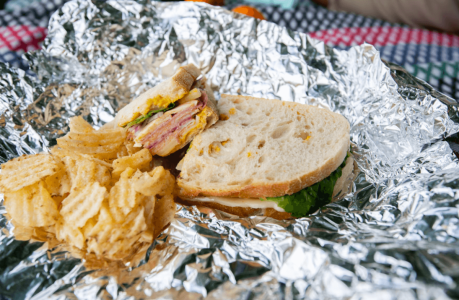
Warm leftovers
While it's important to cool your food down as quickly as possible to reduce the risk of bacterial growth, putting hot food in the fridge can cause chaos with the temperature inside. This can even affect other food in your fridge, compromising its freshness.
On the other hand, leaving your leftovers out for too long is also a big no-no. When food sits in the 'danger zone' - between 5°C and 60°C - for more than two hours, it provides a perfect breeding ground for food-poisoning bacteria to multiply.
To keep your food both fresh and safe, it's best to portion your leftovers into shallow containers and allow them to cool down to around 60°C (roughly when it stops steaming) before popping them into the fridge. This will help to reduce the internal temperature of the food and prevent it from spoiling quickly.
 Here is a list of food products that should be placed in your refrigerator and those that are best left out in the pantry:
Here is a list of food products that should be placed in your refrigerator and those that are best left out in the pantry:
We hope this article is helpful, members! Do you have more to add to this list? Comment down below - we'd love to hear from you.
Also, please remember to share this article with your friends and family, or anyone who could benefit from these kitchen tips.
Then this article is perfect for you. And if not, you still might learn something new!
It's always important to know which foods to store in the fridge, and which ones are best left out in the pantry.
This goes beyond simple food storage preferences; knowing the proper storage conditions of different food items is key to food safety and reducing food waste.

Knowing which foods to store in the fridge and which ones are best left out in the pantry is important. Credit: Pexels/Max Vakhtbovych.
Many fresh foods, such as meat, dairy, and certain types of produce, are prone to bacterial growth and spoiling. Keeping these items in the fridge can help prevent foodborne illnesses, and extend their shelf life.
However, certain fruits and vegetables do better when stored at room temperature, such as tomatoes, bananas, and potatoes. Storing these items on the countertop or in the pantry helps them ripen properly and maintain their flavour and texture.
To ensure your groceries stay fresh and delicious, and help you navigate this tricky but important kitchen hack, CHOICE home economist Fiona Mair and fridge expert Ashley Iredale have come together to bring us a definitive list of foods that should, and absolutely should not, be refrigerated.
You may be surprised at some of the items on this list, so read on because your kitchen holds the key to saving your hard-earned money and protecting your health at the same time!
Which food items SHOULD GO in the fridge?
Cheese
Do you love cheese and want to make sure it stays fresh and tasty? Store your cheese in the dairy compartment of your fridge (usually found on the top of the fridge's door) - this will help prevent it from absorbing odours from other foods and keep it at a temperature that's just right.
But what if your dairy compartment is already full? Don't worry - you can still store your cheese in other parts of the fridge, like the main compartment, if necessary. Just keep in mind that if you store it in a warmer area, it may not last as long. So if you're not planning to eat it right away, it's best to keep it in a colder spot.
When it comes to wrapping your cheese, you might think that cling wrap is the way to go. However, this can cause your cheese to sweat and affect its flavour and texture. Instead, try storing your cheese in the paper it came in or in baking paper, which allows it to breathe and stay fresh.
Milk
We all love the convenience of storing our milk in the fridge door, but did you know that this may not be the best spot for it? The truth is that the shelves on the door are often a bit warmer than other parts of the fridge, which can make it harder to keep milk at the right temperature. Ideally, milk should be kept at or below 4°C to help it stay fresh for longer.
One simple solution is to store it in a colder spot inside the fridge, such as in the main compartment. This can help keep the temperature consistent and ensure that your milk stays fresh and delicious for as long as possible.

It goes without saying that raw food items such as meat and seafood should not be left out in the open. Credit: Unsplash/Kyle Mackie.
Meat, poultry, and seafood
It's important to refrigerate these items as soon as possible after you get home from the supermarket. This can help prevent the growth of harmful bacteria that can cause foodborne illnesses. Ideally, you should store them in the chiller compartment (bottom shelf) of your fridge, which is usually set close to 0°C.
But if your fridge doesn't have a chiller, don't worry - just keep them in the coldest part of your fridge, like at the back where it's less likely to be affected by warm drafts from the door opening and closing.
When it comes to how long you can store these foods in the fridge, it's important to be mindful of food safety guidelines. Raw chicken and other poultry should only be kept in the fridge for a couple of days at most. If you're not planning to use it within that time, it's best to freeze it to avoid the risk of food poisoning.
Cooked chicken, on the other hand, can last a bit longer in the fridge - usually three or four days if stored in an airtight container. Just be sure to heat it to at least 70°C when reheating it to kill any bacteria that may have grown, and don't reheat it more than once to ensure it stays safe to eat.
Cooked rice
When it comes to rice, it's essential to remember that it has a shorter shelf life than other leftovers. This is because it contains a bacterium (Bacillus cereus) that can make you sick if it's not handled properly. Keep in mind that this is not killed off by cooking, so it's crucial to store rice correctly to avoid food poisoning.
If you're planning to store cooked rice, refrigerate it as soon as it's cool enough, ideally within an hour of cooking. When you're ready to eat it, make sure to reheat it thoroughly to at least 60°C, preferably hotter.
If you don't plan to eat the rice within a day or two, it’s best to freeze it. Freezing rice immediately after cooking will preserve it for up to two months. That way, you can always have a delicious and safe meal on hand.

Tomatoes should also be kept out of the fridge as chilling them limits their ability to generate substances that contribute to aroma and taste. Credit: Pexels/PhotoMIX Company.
Which food items SHOULD NOT GO in the fridge?
Tomatoes
If you love the taste of fresh, juicy tomatoes, you might want to keep them on your kitchen bench instead of storing them in the fridge. Research has shown that temperatures below 12°C can limit the development of aroma and flavour in tomatoes, making them less tasty to eat.
Mair suggests keeping tomatoes in a fruit bowl to maintain their full flavour. Mair also recommends buying a mix of firm and slightly soft tomatoes so you can enjoy perfectly ripened ones throughout the week.
Also, make sure to keep them away from ethylene-producing foods like bananas, apples, pears, and oranges (so perhaps not in the fruit bowl after all…). Ethylene is a gas that can accelerate the ripening process and cause your tomatoes to spoil more quickly.
Coffee
Do you keep your coffee in the fridge to keep it fresh? Well, you might want to rethink that - apparently, doing this can make it lose its flavour and absorb odours from other foods in your fridge. Yuck! No one wants to taste garlic or cheese in their morning coffee.
To keep your coffee tasting its best, store it in an airtight container in a cool and dark place, like your pantry. This will keep your coffee beans away from sunlight, heat, steam, and moisture. If you want your coffee to taste even better, buy fresh coffee beans and use them within one to four weeks after roasting.
Some people freeze their coffee to keep it fresh for longer. However, experts recommend against it. But if you do decide to freeze your coffee, make sure you put it in a truly airtight container and freeze it in small portions. Also, keep in mind that once you take out the coffee from the freezer, it's best not to put it back in again.

Uncut root veggies go in the pantry, but once cut, they should be stored in the fridge. Credit: Unsplash/Nguyen Dang Hoang Nhu.
Uncut root vegetables
What about storing some of your favourite root vegetables? Potatoes, onions, sweet potatoes, and garlic should be stored outside of the fridge - and in a cool, dry, and dark spot in your kitchen.
According to experts, root vegetables absorb moisture in the fridge, leading to fermentation (faster rotting) and a reduction in taste and quality.
Once they're cut, though, it's a different story.
For instance, cut onions are best covered or placed in a sealed container and stored in the fridge. As for whole pumpkins, they can be stored outside of the fridge for many weeks, but once cut, they should be stored in the fridge as well.
Oils and sauces
When it comes to oils and sauces, it's important to store them correctly to ensure they last and taste their best.
According to Mair, coconut oil should be kept in a cool, dark place like the pantry, while nut and seed oils are best kept in the fridge to prevent them from going rancid quickly.
As for sauces, it all depends on the type and whether they've been opened. Always check the label to see if it says 'refrigerate after opening' for bottled sauces like soy sauce, sweet chilli sauce, oyster sauce and curry pastes.

Honey won't go off, no matter where you keep it - but if it's in the fridge it'll harden and crystallise. Credit: Unsplash/Arwin Neil Baichoo.
Honey and nut spreads
If you're a honey or nut spread lover, you may be wondering how best to store these delicious treats. Well, the answer depends on the specific type of spread you have. So, always remember to check the label for advice.
Honey is one of the most unique foods on the planet, as it never spoils! This is because bacteria can't grow in it. So, you can leave your honey in your pantry, where it will stay soft and easy to spread. When refrigerated, honey crystallises, but don't worry - it's still perfectly edible.
However, it's worth noting that botulism, a type of bacteria, may be present in honey. While this isn't harmful to adults, it's best to avoid giving honey to babies under 12 months old.
When it comes to peanut butter, it's okay to keep it in your pantry for up to three months after opening. But if you want to extend its shelf life and avoid oil separation, you can also keep it in the fridge. However, be aware that this could make it harder to spread.
Fresh herbs
If you're a fan of adding fresh herbs to your meals, you may be wondering where the best place is to store them to keep them fresh for longer. According to experts, some herbs like coriander and mint are best stored in the fridge crisper. Just wrap them loosely in some absorbent paper and pop them into a sealed container.
But when it comes to basil and parsley, things get a bit trickier. These herbs are better off outside the fridge, as the dry air in the refrigerator can cause the leaves to wilt quickly and turn a less-than-appetising shade of brown.
To store them, you can simply cut the bottom of the stems and place them in a jar with a small amount of water. This will keep them fresh for longer, but be sure to change the water and trim the stems every couple of days.

Leave your leftovers out for too long and you run the risk of letting food-poisoning bacteria multiply. Credit: Unsplash/Matthew Moloney.
Warm leftovers
While it's important to cool your food down as quickly as possible to reduce the risk of bacterial growth, putting hot food in the fridge can cause chaos with the temperature inside. This can even affect other food in your fridge, compromising its freshness.
On the other hand, leaving your leftovers out for too long is also a big no-no. When food sits in the 'danger zone' - between 5°C and 60°C - for more than two hours, it provides a perfect breeding ground for food-poisoning bacteria to multiply.
To keep your food both fresh and safe, it's best to portion your leftovers into shallow containers and allow them to cool down to around 60°C (roughly when it stops steaming) before popping them into the fridge. This will help to reduce the internal temperature of the food and prevent it from spoiling quickly.
Tip
Remember that while it's generally advised to store these food items in your pantry or cupboard, it's important to think about the climate and weather in your area. If your kitchen is too hot or dry, it can cause your food to spoil faster than expected.
We hope this article is helpful, members! Do you have more to add to this list? Comment down below - we'd love to hear from you.
Also, please remember to share this article with your friends and family, or anyone who could benefit from these kitchen tips.

